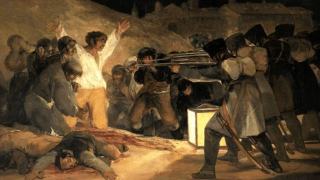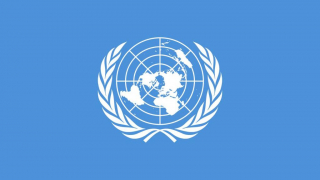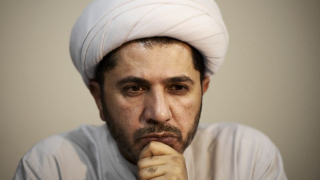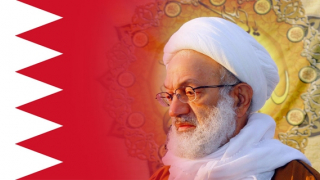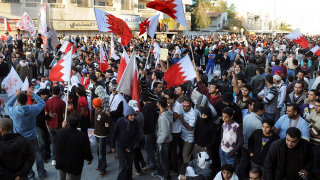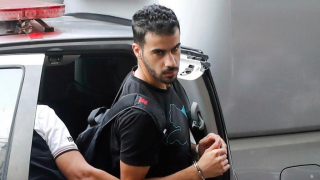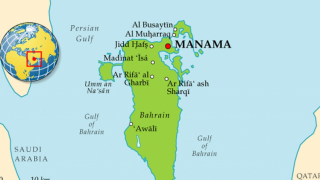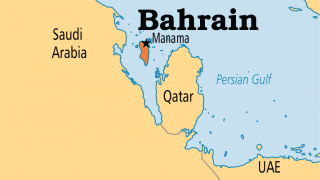Bahrain, whose ears are deaf to the dialogue initiatives put forward by the opposition, urges Russia to dialogue with Kiev
Bahrain’s King Hamad bin Isa has lectured on dialogue, freedom, and diplomacy, during his meeting in late May with Russian Foreign Minister Sergey Lavrov, in Manama.
In contrast, he insists on ignoring calls for dialogue by its adoption of the repressive security approach in the face of the rightful demands of the people.
The king has called for resolving the conflict with Kyiv in order to put an end to the conflict and ensure security and peace. However, he deliberately overlooks the bloody record and the menacing mentality that have accompanied his rule for more than a decade.
These statements show the king as if he is keen to resolve crises by means of negotiations and the logic of peace. Nevertheless, since 2011, the date of the onset of the ongoing pro-democracy movement that was met with brutal repression, the king has practiced all sorts of violations, ignoring the opposition’s repeated calls for dialogue.
The current uprising only demands reforms and intuitive rights, enabling the citizens to participate in the decision-making process, ensuring the principle of separation of powers, combating corruption, nepotism, sectarian discrimination, and political naturalisation.
The same king has faced these demands with iron and fire. His regime has persecuted, dismissed, marginalised, defamed, summoned, investigated, arrested, judged, tortured, executed, and banished the peaceful dissents. Besides, it has dissolved political societies, assaulted religious freedoms, demolished mosques, and forfeited nationalities.
Seemingly, dialogue, as far as the king is concerned, is marginalisation, exclusion, restriction of freedoms, and blocking all doors to opposition initiatives, especially these that have occasionally been proposed by Al-Wefaq Society, Bahrain’s prominent arbitrarily-dissolved political bloc, such as the “Manama Document”, “Document on Nonviolence,” “Bahrain Declaration” and the “No to Hatred Document” as well as many other similar calls that contribute to national reconciliation, and launch a serious dialogue that paves a way to a comprehensive solution that does justice to all citizens and achieves permanent security.
This regime, which calls for dialogue, rules by the logic of “me and no one,” controls all authorities, and manipulates sovereign decisions. This is exactly clear when it has normalised bilateral ties with the Zionist occupation entity, ignoring the popular opinion in support of the righteous Palestinian cause and the legitimate rights of the Palestinian people.
Likewise, it is a regime that is submissive to Saudi Arabia, as it is unbelievably subject to its desires and dictates. Everyone remembers what happened in March 2011, when it summoned the Saudi army to evade Bahrain and crush the armless mass protests.
Al-Wefaq has called for a comprehensive dialogue with the government “in the hope of expanding meaningful citizen participation in the country’s political process”. As mentioned earlier, this is not the first time Al-Wefaq expresses its readiness for talks. But the latest call for dialogue comes as Manama gears up for a new legislative election from which opposition groups have been barred.
Bahrain’s top Shiite cleric Ayatollah Sheikh Isa Qassim recently confirmed the elections were futile in a country where the House of Representatives does not represent the people. Echoing Ayatollah Qassim’s position, Al-Wefaq has stressed the current parliament has “no constitutional or other legal grounds”.
On the seventh anniversary of his unfair detention, Al-Wefaq’s detained SG, Sheikh Ali Salman, said he is still open to dialogue, stressing that tolerance and giving priority to national interests “keeps our hearts and hands always open for dialogue”.
“The desired political reform is in the interest of all, the rulers and the ruled, and it is the cornerstone for improving our economy and living conditions, and achieving political stability”, affirmed the detained leader, who is serving a life sentence on trumped-up espionage charges.
Last September too, Sayyed Taher Al-Moussawi, a senior member of Al-Wefaq’s General Secretariate, said, last Septembre he is hoping that Manama will adopt a “courageous and patriotic political stance” in response to a call of Ayatollah Isa Qassim who urged the government to enter into dialogue with the opposition, explaining that it is the only way “to achieve the reform the country needs”. Sayyed Al-Moussawi described the call as “balanced and flexible” that “may open closed doors and transcend the state of political stalemate.”
Last July too, Al-Wefaq reiterated its readiness for dialogue calling for a political solution to the deepening crisis in the country. “We renew our call for the need for serious and sincere work to get out of the political crisis through a comprehensive political solution,” Al-Wefaq said, adding, “The search for new ways and methods to circumvent or escape from the basic political demands is a losing battle that will only deepen the crisis in Bahrain”.
Marking 11 years since the start of Bahrain’s pro-democracy uprising, the opposition group stated that more than a decade of “government repression, excessive force and provocations have failed to draw people into violence.” It added, “We will continue to propose and present this initiative for the sake of Bahrain” stressing that it seeks “dialogue and understanding, provided that it leads to a serious & effective political settlement”. Al-Wefaq said it aspires for “a state of institutions, freedoms and law” pointing to the absence of trust between the people and the ruling elites while the country, plagued by corruption, is witnessing a decline in the standard of living.
Further, its deputy SG, Sheikh Hussein Al-Daihi asserted that this repression continues to exclude the people from “political, economic, social and financial decision-making”. Sheikh Al-Daihi blamed Bahrain’s economic decline on corruption and mismanagement, and accused the Manama regime of rejecting mediation efforts while Al-Wefaq engaged positively and responsibly with such proposals “for the sake of the nation’s interest”.
A decade of prevarication and neglect led to the accumulation and exacerbation of political dilemmas, after which the King did not go to launch a comprehensive national dialogue. A policy that pushes citizens today, on the eve of the upcoming elections to boycott as long as the assembly neither represents them nor enacts laws that serve their interests or address their plights.
Its only function is inciting hatred and fabricating false accusations against Iran, imposing taxes, looting pension rights, reducing services, delaying housing services, ignoring the low level of medical services, and high prices, and tightening the restriction that have pushed even the loyalists of the ruling regime to complain about its fragile performance.
The Bahrainis realise that the ballot is nothing but a sham process that will produce only helpless representatives, not to mention that the imposed political isolation prevents the broad popular opposition from participating in the electoral process, nomination and election. A general popular resentment against the government, and the opposition is nonetheless insisting on resolving the crisis, despite all pains!!!


